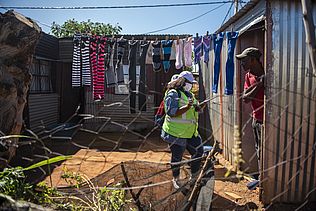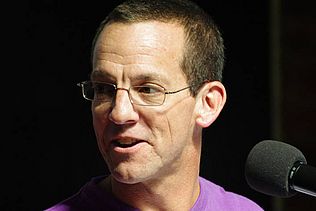“What do you do as a community health worker if you’re supposed to help a patient take medicine, but they don’t have enough to eat and can’t tolerate the medicine on an empty stomach. Do you give them the medicine anyway? Or do you go off and buy food with your own money?”
When Juliet Kabe worked in a poor district as a community health worker, she was confronted daily with this dilemma of needing to make up for what unequal living conditions and poverty are doing to people’s lives. This experience moved her very deeply, and brought her to tackle the precarious situation of health workers. For a paltry wage and largely without any rights, the women and few men in this field perform an extremely important function in the public health service.
Juliet is now working at Khanya College, Johannesburg, and is fighting for better working conditions for health workers in communities in the Gauteng Province. Since 2014 Khanya College has been working with six partner organisations on a network project supported by medico for strengthening self-organisation of care workers. With a tremendous talent for organisation and a lot of fervent commitment, Juliet helped achieve a first major success in 2016. The Labour Court recognised on 18 March 2016 that care workers are not voluntary aides but workers, so that the normal labour laws apply to them as well. This was a pioneering ruling. But the ink was hardly dry when the Ministry of Health started unceremoniously outsourcing the employment contracts to a private company.
However, the women in the Gauteng Community Health Care Forum refused to capitulate. They organised committees in almost 80 local clinics, followed by petitions, information events and protest marches, until the Minister of Health was forced to respond to the protest. The outcome is still uncertain.
Regardless of that, however, the project has created a movement for self-empowerment among these previously exploited individuals. Juliet explains that a platform was created which the care workers used to network, where they can talk about their experiences and concerns, and also about their common struggle. “In everyday life, the women are often left on their own resources. But here, they can back each other up.” She herself has been changed by the medico network project. “I’ve learned how to draw up budgets, write reports and manage projects myself. This gives me strength.”
Maria Hartmann and Usche Merk





